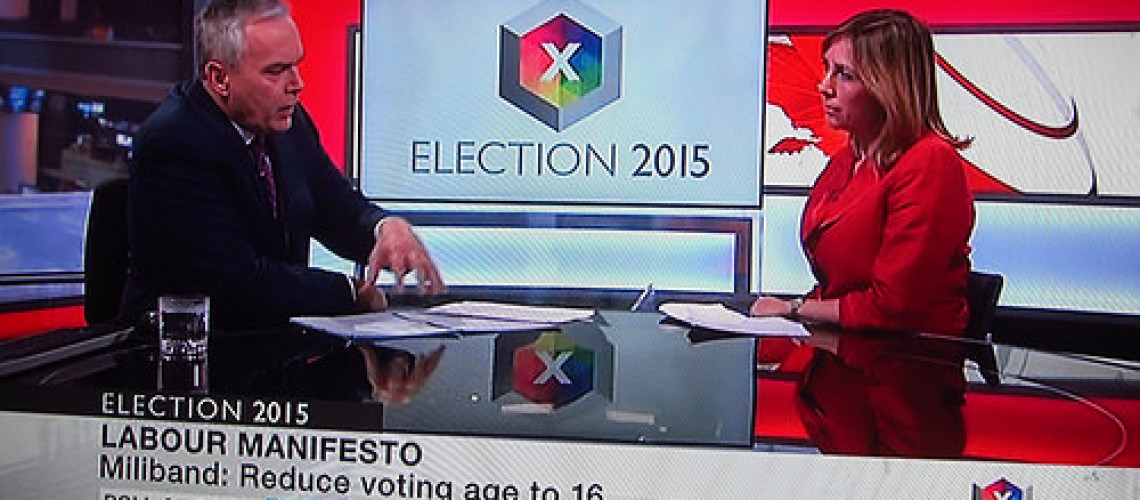In characteristic take-no-hostages style, BBC News chief James Harding has defended in the Corporation’s General Election coverage.
His message – delivered in his trademark pugilistic style without a scrap of supportive evidence to BBC-loving chums at a media conference – was exactly in line with that from senior BBC figures on such occasions: ‘Move along there, nothing to see. We did brilliantly. We got complaints from everyone and that proves we were unbiased’.
Harding claims to believe that his dismissal of the criticism is not based on simple metrics, but nothing in his speech suggests that more subtle techniques of analysis were used.
You can read his full speech here on the News-watch website. The key underpinnings are flawed logic and bombast. And while claiming the Corporation welcomes ‘criticism’, he dismisses out of hand all complaints from politicians because they were based on blatant and risible self-interest.
Harding says that, though astonished by the ferocity of complaints, he looked at each on its merit. Every word of his speech suggests otherwise.
Ukip, he claims, were worried that they were being ‘shut out by the establishment’. Pardon? That’s an exercise in smoke and mirrors.
The main problem about BBC’s coverage of Ukip was not that they were ‘shut out’, but rather that almost every interview, such as this by Mishal Husain on Today, was ‘painting by numbers’. The main intent was to portray the party as basically as racist, air-headed thugs, exactly in line with what BBC interviewers have been doing for years.
Another major issue was that when Nigel Farage appeared on the BBC-staged challengers’ debate, the audience was packed with people whose main objective was hurl abuse at him. The panel itself was allowed to shout him down by force of numbers. Further, no question was asked of the candidates about the EU, the primary issue that distinguished Ukip from all the other parties represented.
A third – linked to the challengers’ debate -was gross bias by omission. Coverage of the EU as an election theme disappeared almost to vanishing point. The main parties might not want to have talked about the subject, but it was the BBC’s job to be proactive on this front and they were not.
Harding’s main argument, however, raises even more concerns. He suggests that the British people voted for a Conservative government, and therefore, any idea that any element of BBC output was skewed to the left can be dismissed.
Here, there is so much wrong with his logic and assumptions that it is almost impossible to know where to start unpicking them.
Point one: How could he possibly know what persuaded the voters who actually voted ‘Conservative’ to do so? It seems, however, that he thinks the BBC’s coverage had some role in the party’s success. He provides no evidence for his argument, so it would be interesting to know on what this is based.
If Harding believes this, it surely also means that the BBC had some role in dissuading people to plump for other parties?
Point two: His logic does not actually stand up to scrutiny. He has set up a false Aunt Sally. The speech provides no hard evidence that the BBC was not biased against the Conservative party. So it is equally possible to argue that the biased coverage may have led to a reduction in the Conservative (and Ukip) vote. In contrast to Harding, abundant evidence has been provided on TCW and News-watch that indeed it did.
Point three: Harding makes several admissions in his speech that there were mistakes in coverage, for example a disproportionate focus on a hung result and the need for a coalition. Yet he immediately claims – again without providing a shred of evidence – that this has not affected impartiality.
The question here is, how does he know? It looks to be another default assumption that what the BBC does is right, even when it gets things wrong. The reality is that unpicking issues of bias is often a slow and painstaking operation of sifting through the transcripts of what was actually said. If he has got that evidence, he should declare it and let others decide. Instead – as usual – the Corporation is its own judge and jury.
There are other massive holes in his polemic but there is not the space here to go into all of them. Suffice it to say that the main substance of his defence evaporates as soon as it is scrutinised.


